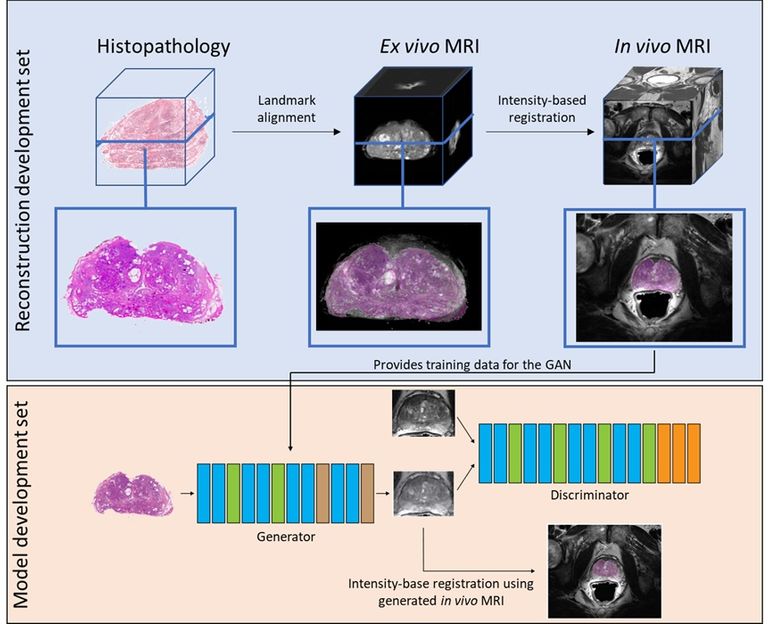
Background
One million men receive a prostate cancer diagnosis, and three hundred thousand die from prostate cancer each year worldwide. This project focusses on integration of histopathological and radiological images to improve our understanding of disease diagnosis and progression in prostate cancer. In medicine, different specialties tend to operate in silos, each with their own tools to best help patients. They seldom cross-pollinate, limiting cross-specialty learning, which could offer key insights to improve diagnostics, especially at the intersection of radiology (in vivo) and pathology (ex vivo). To fuse these two specialties, you will develop AI algorithms to perform 3D reconstruction of 2D histopathology images, spatially align them with ex vivo and in vivo MRI of the prostate and train generative adversarial models to transform one modality into the other. The project also has strong experimental and clinical components, including ex vivo MRI scanning of tissue and interactions with urologists, pathologists and radiologists.
Profile
You are a creative and ambitious researcher with a MSc degree in Computer Science, Data Science, Engineering, Technical Medicine, Biomedical Sciences or similar, with a clear interest in artificial intelligence and medical image analysis. Good communication and organizational skills are essential. Experience with deep learning and programming, preferably in Python, are a plus and should be evident from the (online) courses you've followed, your publications, GitHub account, etc.
Organization
Computational Pathology Group
The Computational Pathology Group is a research group of the department of Pathology of the Radboud University Medical Center (Radboudumc). We are also part of the cross-departmental Diagnostic Image Analysis Group (DIAG) at Radboudumc, with researchers in the departments of Radiology and Nuclear Medicine, Pathology and Ophthalmology.
We develop, validate and deploy novel medical image analysis methods, usually based on the newest advances in machine learning with a focus on computer-aided diagnosis (CAD). Application areas include diagnostics and prognostics of breast, colon, prostate and lung cancer, but also non-oncological topics such as kidney transplantation. Our group is among the international front runners in the field, witnessed for instance by the highly successful Camelyon and Panda grand challenges which we organized.
Radboudumc
Radboud university medical center is a university medical center for patient care, scientific research, and education in Nijmegen. Radboud university medical center strives to be at the forefront of shaping the healthcare of the future. We do this in a person-centered and innovative way, and in close collaboration with our network. We want to have a significant impact on healthcare. We want to improve with each passing day, continuously working towards better healthcare, research, and education. And gaining a better understanding of how diseases arise and how we can prevent, treat, and cure them, day in and day out. This way, every patient always receives the best healthcare, now and in the future. Because that is why we do what we do.
Read more about our strategy and what working at Radboud university medical center means. Our colleagues would be happy to tell you about it. #weareradboudumc
Application
Please apply before Nov 22, 2021 via this link. Here you can also find more information on the application process and what needs to be included in your application.
